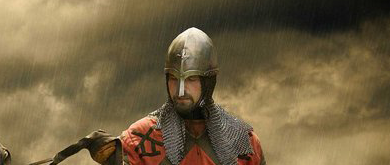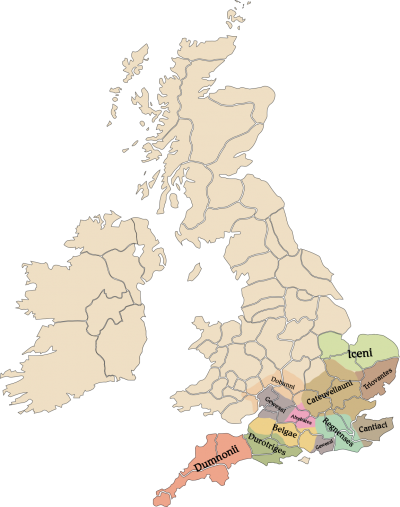Cymrii

The Cymri (pronounced "kym-ri") are one of the most populous Cultures in all of Britain. Cymric people can be found as far north as Strangorre and Lothian all the way to the southern kingdom of Logres.
Long, long ago, "in the legendary times, before Rome was even founded," refugees from Troy came to this island seeking their destiny. Their leader was Brutus, a grandson of Aeneas, and from his name the island was called Britain. Brutus and his men drove out the savage race of monstrous giants who inhabited it. They established relationships with the ancient gods and goddesses and with the faerie races that live underground and in hidden kingdoms. They settled far and wide, giving every place its proper name. Ever since, the Cymric people have been the dominant British people.
Cymric principles are not based on imperial aggression, like the Romans. They are based on "humility, honor, and unity" and on "recognition of our place in the land." The Cymric peoples, or Cymri, rightfully disdain "Roman greatness," which is based on an arrogant and selective memory. They don’t talk about the fact that the great Julius Caesar was driven off. Yes, Rome came back and "temporarily conquered" the island, settling many cities, but when the empire dissolved into civil war, it was a Briton, Constantine the Great, who took British soldiers and united it again. When Armorica was devastated by barbarians and disease, it was Britons who resettled it. So the Romans came, but the proud Cymri were not assimilated and have subsequently reasserted their national character.
Land
The cymric culture is spread over a large area. In this setting we differ the Cymrii from the Cambrian tribes. The map below show the original tribal spread, it's a good indicator of where the cultures spread to modern feudal society.
Tribes
| Durotriges: | |
|---|---|
| The Durotriges is a confederation of Cymric tribes living in what is now Dorsette and southern Salisbury. Since much of the tribal culture has begun dwindle as the newer feodal systems take place, much of the older tribal ways are lost. But still some of the older triditions still remain, and many still consider themselves Durotriges.
As most Cymric tribes, the Durotriges are honorable, loyal and brave. More than many other tribes, they tend to remember the old ways and many of them still stick to the Pagan religion. Like many other tribes, the Durotriges initially tried to fight the Romans. But they quickly realised the overwhelming odds. Many of the smaller clans left the open plains and went deep into the woods, others paid the romans tribute to be left alone. Most Durotriges still remember that family comes first, and you do what you have to to make it work. |
| Belgae: | |
|---|---|
| The Belgae is a large confederation of Cymric tribes living in what is now Logres. Since much of the tribal culture has begun dwindle as the newer feodal systems take place, much of the older tribal ways are lost. But still some of the older traditions still remain, and many still consider themselves Belgae.
The Belgae pride themselves on honor, loyalty and recognizing their part in the community. They take pride in history, learning from what has happened. They honor the dead, and celebrate the living. The Belgae tried to stand up against the Romans, and put a hard fight against them when they took Britain. But they ultimately lost against the overwhelming armies of Rome. Even though it was som many hundreds of years ago, the loss still sting in the heart of many warriors. The wise of the Belgae, say that this thought them humility. They dislike the roman culture, but has accepted history. They adapted the feudal society quickly. |
| Gewessi: | |
|---|---|
| The Gewessi were a British tribe based in Hantonne, Glevum and parts of Gentian, who had scattered to the four winds with the rise of Aurelius Ambrosius – for they were the clan of King Vortigern, the corrupt High King who had first brought the Saxons to British shores.
The Gewessi considers themselves the strongest of all tribes, and still see themselves as rulers. |
| Dumnonii: | |
|---|---|
| The Dumnonii or Dumnones were a British tribe who inhabited Dumnonia, the area now known as Ascalon and Cornwall (and some areas of Dorsette and Summerland) in the further parts of the South West peninsula of Britain, from at least the Iron Age up to the early Saxon period. They were bordered to the east by the Durotriges tribe.
They dislike the Durotriges tribe and had many wars in the old days. |
| Atrebates: | |
|---|---|
| The Atrebates (singular Atrebas) were a Belgic tribe of Gaul and Britain before the Roman conquests. Most of them were wiped out in the roman invasion, but some has remained and still talk of the old ways. The areas where they formerly lived, mostly current Rydychan and Gentian has long been taken over by other tribes and cultures.
Though almost completely instinct, they are a proud tribe. |
| Regnenses: | |
|---|---|
| The Regnenses, Regni or Regini were a British Celtic kingdom and later a civitas of Roman Britain. Their capital was Noviomagus Reginorum, known today as Chichester in Suth Seaxe.
They integrated will with the Roman culture. |
| Catuvellauni: | |
|---|---|
| The Catuvellauni were a Celtic tribe or state of southeastern Britain before the Roman conquest, attested by inscriptions into the 4th century. They led the resistance against the conquest in AD 43.
Their territory was bordered to the north by the Iceni and Corieltauvi, to the east by the Trinovantes, to the west by the Dobunni and Atrebates, and to the south by the Regnenses and Cantiaci. They are still resistant to roman culture. |
| Dobunni: | |
|---|---|
| The Dobunni were one of the Iron Age tribes living in the British Isles prior to the Roman invasion of Britain. Their original name may have been "Bodunni", connecting this with the Celtic word *bouda meaning "Victorious", in the sense of "The Victorious Ones".
They have a complicated relationship with the Gewessi. |
| Cantiaci: | |
|---|---|
| The Cantiaci or Cantii were an Iron Age Celtic people living in Britain before the Roman conquest, and gave their name to a civitas of Roman Britain. They lived in the area now called Kent, in south-eastern England. Their capital was Durovernum Cantiacorum, now Canterbury.
They were more or less all slaughtered by King Aelle in his invasion. |
| Trinovantes: | |
|---|---|
| The Trinovantes or Trinobantes were one of the Celtic tribes of pre-Roman Britain. Their territory was on the north side of the Thames estuary in current Est Seaxe, and included lands now located in Greater London. They were bordered to the north by the Iceni, and to the west by the Catuvellauni. Their name derives means "the very vigorous people. Their capital was Camulodunum (modern Colchester).
They were said to have a special connection with the other-world. |
| Iceni: | |
|---|---|
| The Iceni were a Brittonic tribe of eastern Britain during the Iron Age and early Roman era. Their territory included present-day Norfolk and parts of Suffolk and Cambridgeshire, and bordered the area of the Corieltauvi to the west, and the Catuvellauni and Trinovantes to the south. In the Roman period, their capital was Venta Icenorum at modern-day Caistor St Edmund.
The Iceni were a significant power in eastern Britain during Claudius' conquest of Britain in AD 43, in which they allied with Rome. Increasing Roman influence on their affairs led to revolt in 47, though they remained nominally independent under king Prasutagus until his death around AD 60. Roman encroachment after Prasutagus' death led his wife Boudica to launch a major revolt from 60–61. Boudica's uprising seriously endangered Roman rule in Britain and resulted in the burning of Londinium and other cities. The Romans finally crushed the rebellion, and the Iceni were increasingly incorporated into the Roman province. The Iceni hates the saxons, and have been raided by them since time immemorial. They have almost completely been wiped out by the Angles. |
Skills & Traits
Cymric stock tends to produce taller, larger people than other cultures.
Cymric training focuses on spears & lances and all of their menfolk are confident in using such weapons on foot or horseback. Their knights are thusly regarded as the finest mounted warriors in the land whose charge is second to none.
Religions
British Christian
"Ours is the first established Christian Church. Before Saint Peter was in Rome, the most holy Joseph of Arimathea founded his church here. And Joseph brought the Holy Grail, which is the most important relic of Christianity, for it held the blood which He spilled to redeem mankind.”
British Christianity is a local religion with a different infrastructure to the Roman Christian church. Key differences include that local kings, not Rome, appoints men to the rank of bishop, a stronger focus on clerical poverty, less focus on the concept of Original Sin and a different calculation of the date of Easter. (This last one may sound like trivia but, as the most important holy day in the Christian calendar, it is a major source of friction.)
Religious traits for British Christian knights are: Chaste, Energetic, Generous, Modest, Temperate.
British Pagan
"Our religion is based on respect for the land and its resident powers, whom our ancestors have worshipped for uncounted generations. It is natural and local, and we wouldn’t abandon it for an upstart minority creed started by a prophet who lived far away, in a land entirely unlike ours."
Paganism is the native religion of Britain. A mixture of local practices and beliefs, Paganism is often characterized by beliefs and attitudes that differentiate it from Christianity. The most obvious is the worship of many immortal and sometimes deific entities called gods, goddesses, and spirits. These entities inhabit the landscape, the sky, the sun, the moon, and other parts of the world, and also the Other Side (also called the Spirit Realm, the Faerie Realm, or any number of other such titles). They imbue the world with a life force and consciousness. By living in harmony with these natural forces, people live happier, healthier, safer lives. Paganism believes in an afterlife, on the Other Side, and druids also taught that souls reincarnate back onto our side as well.
Religious traits for British Pagan knights are: Lustful, Energetic, Generous, Honest, Proud.
Roman Christian
"Saint Peter was the favorite of Our Lord Jesus, and he founded the only True Church. It has survived intact as our organization of bishops. Of course we obey the Pope."
Roman Christians follow the church founded by Peter, the head of Jesus' apostles and one-time religion of the Roman Empire. They believe in be "One God, One Church, One Bishop," with the Roman Bishop declared to be pre-eminent, invested as Pope. They practice centralization and tight control of all churches, with church fathers standardising the New Testament Bible, sacraments, and holy days. Although most of the fundamentals are superficially identical to British Christianity, there is enough different to create tensions that have on occasions flared into open conflict.
Religious traits for Roman Christian knights are: Chaste, Forgiving, Merciful, Modest, Temperate.











